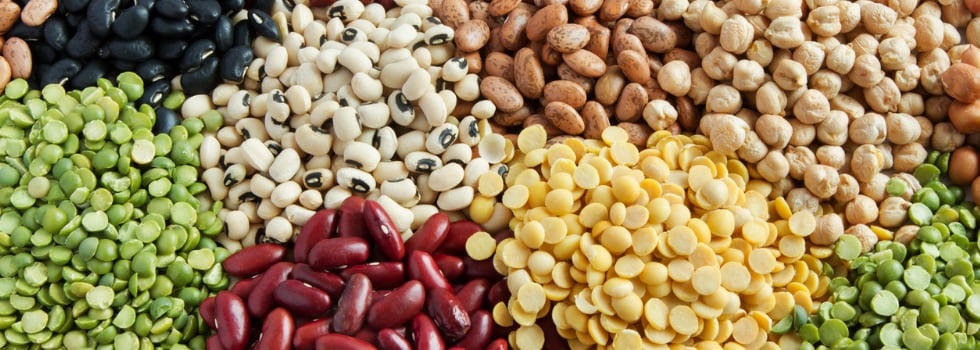Agriculture began more than 10 000 years ago when gatherers and hunters turned into farmers; since then, legumes – plants belonging to the Fabaceae (or Leguminosae) family - have been part of the human diet, traditionally cultivated for for human consumption, for livestock forage and silage, and as soil-enhancing green manure.
Legumes probably were one of the first crops cultivated by mankind and have remained a staple food for many cultures all over the world. These seeds are valued worldwide as an inexpensive meat alternative and are considered the second most important food source after cereals.
To raise awareness about the importance of legumes and highlight their role in healthy diets and family farmers’ livelihoods as well as their contribution to soil health and the environment, the United Nations General Assembly declared 2016 as the International Year of Pulses (IYP). The Food and Agriculture Organization of the United Nations (FAO) was mandated to facilitate the implementation of the IYP, together with all relevant stakeholders.
FAO applies the term “pulse” to legume crops harvested solely to get dry seeds and recognises 11 types of pulses which are cultivated worldwide, among which dried beans, lentils and peas are the most known and consumed.
Crops which are harvested green, like for instance green beans and peas, and seeds mainly grown to extract oil, e.g. soybeans and peanuts, as well as sowing forage (alfalfa and clover) are classified as vegetable crops.
Legumes are recognised worldwide as a sustainable and inexpensive alternative to meat and are considered the second most important food source after cereals.
In many countries, legumes are a consumed on a regular or even daily basis.
They are nutritionally valuable, being a great source of proteins (20–45%) with essential amino acids, complex carbohydrates (±60%) and dietary fibre (5–37%), essential for supporting digestive health and helping to reduce the risks of cardiovascular diseases.
Low in sodium, they have no cholesterol and are generally low in fat - with ±5% energy from fat, except for peanuts (±45%), chickpeas (±15%) and soybeans (±47%) - which can contribute to reducing the risk of cardiovascular diseases.
They are also a good source of essential minerals (iron and potassium) and folate, a B vitamin naturally present in many foods that is essential to the nervous system function and especially important during pregnancy to prevent foetal defects.
Legumes are also a source of a particular starch which is broken down by bacteria in the large intestine to produce short-chain fatty acids (such as butyrate) used by intestinal cells for food energy.
Considering the excellent nutritional facts about legumes, FAO and nutrition experts recommend increasing the consumption of legumes and pulses in the daily diet. Legumes are a great alternative to industrial snacks for everybody, not only for vegans and vegetarians but particularly for kids and for seniors as well.
The key points which make legume-based products a great alternative to traditional snacks can be summarized in natural production processing, the nutritional balance, excellent flavor and taste, and a wide application range.
Impulses: a new line of legume-based snacks
After several years of research and thanks to the expertise gained in the hydrothermal treatment of legumes and cereals, Naturis, an Italian company specialized in the production of legumes- and cereals-based foods, is now launching on the US market a range of new legume-based snacks to meet the increasing demand for plant-based nutrition.
Impulses is Naturis’ new line of legume-based snacks, crunchy grains and seeds treated in a natural way to be consumed instantly, as a snack, in a salad or even in breakfast muesli, allowing food companies to successfully use legumes in their most classic formulations and direct consumption; they are not fried, making them very healthy.
Contrary to products commonly used as snacks such as dried fruit, which normally might contain an important quantity of fats and sugars, crunchy pulses and seeds feature a great nutritional profile and provide a balanced dosage of proteins, carbohydrates, and fats, the majority of which are unsaturated. They are also a great source of fibres and minerals, such as iron, zinc, phosphorous, folate and B vitamins.
The industrial process is natural and involves the use of water and thermal energy without changing the basic properties of the legume. Thanks to this natural process, nutritional properties of legumes are amplified and make proteins more readily available for their biological absorption.
The process also results in a very pleasant, lightly roasted flavor, modifying and amplifying the typical notes of cooked legumes, making them distinguishable and good.
The application of these products on the food market varies according to the final product.
Impulses products are particularly suitable for bakery products, in the production of high nutritional value bars, in the preparation of breakfast mixes or as delicious additions to salads.
Furthermore, to get an even tastier touch, they adapt well to a rapid passage in oil to obtain a golden color and an even more crunchy and appetizing texture.
The line includes lentils, yellow peas, green peas, chickpeas to be used as they are or to add them in predefined mixes.


Naturis’ cereals- and legumes-based products are distributed on the North American market by Faravelli Inc, the US subsidiary of Faravelli. Faravelli began operating in its native Italy in 1926, before going on to establish a presence in North America in 2014.
References
http://www.fao.org/world-pulses-day/en/





